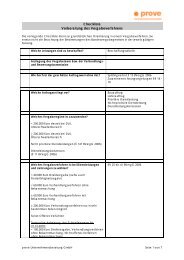Cross-programme evaluation: joint summary - Interact
Cross-programme evaluation: joint summary - Interact
Cross-programme evaluation: joint summary - Interact
You also want an ePaper? Increase the reach of your titles
YUMPU automatically turns print PDFs into web optimized ePapers that Google loves.
INTERACT<br />
Joint <strong>summary</strong> – thematic and operational aspects of cross-border cooperation in Central and South-Eastern Europe<br />
Executive <strong>summary</strong> – INTERACT study towards cross<strong>programme</strong><br />
<strong>evaluation</strong><br />
INTERACT Point Vienna conducted two pilot studies to test <strong>joint</strong> <strong>evaluation</strong>s of cross-border cooperation <strong>programme</strong>s<br />
in Central and South-Eastern Europe. The studies differ in terms of focus and approach: The “operational<br />
study” addresses operational and technical aspects involved in implementing <strong>programme</strong>s and the “thematic<br />
study” deals with thematic aspects and the added value of cross-border cooperation. The operational<br />
study was led by Richard Hummelbrunner and the thematic study by Kai Böhme.<br />
With these studies, INTERACT Point Vienna aims to contribute to the wider discussion of better and more useful<br />
<strong>evaluation</strong>s of cooperation <strong>programme</strong>s. Cooperation <strong>programme</strong>s are expected to conduct <strong>evaluation</strong>s before,<br />
during and after the programming period. Evaluations are conducted at a specific point in time, for example a<br />
“mid-term <strong>evaluation</strong>”, or they are extended over a longer time span, covering various phases during the life of<br />
the <strong>programme</strong>, as in an “on-going <strong>evaluation</strong>”. The current regulatory framework, for 2007-2014, is the first to<br />
explicitly mention the possibility of conducting <strong>joint</strong> <strong>evaluation</strong>s involving several <strong>programme</strong>s:<br />
Article 47(2) of Regulation 1083(2006)<br />
„Evaluations may be of a strategic nature in order to examine the evolution of a <strong>programme</strong> or group of <strong>programme</strong>s<br />
in relation to Community and national priorities, or of an operational nature in order to support the<br />
monitoring of an operational <strong>programme</strong>. Evaluations shall be carried out before, during and after the programming<br />
period.‟<br />
With this framework, Member States are not limited to <strong>evaluation</strong>s at the level of the operational <strong>programme</strong>. In<br />
fact, they are encouraged to undertake <strong>evaluation</strong>s by themes/priority axes/groups of actions/major projects or<br />
by policy fields across operational <strong>programme</strong>s 1 .<br />
Joint <strong>evaluation</strong>s offer new opportunities for cooperation <strong>programme</strong>s, and they have the potential to complement<br />
individual <strong>programme</strong> <strong>evaluation</strong>s in meaningful ways. For instance, <strong>joint</strong> <strong>evaluation</strong>s can help identify<br />
bottlenecks that are specific to one cooperation <strong>programme</strong> but not to another. They can also be a very useful<br />
tool for a mutual learning process, because a <strong>joint</strong> <strong>evaluation</strong> can indentify practices/solutions that could be<br />
transferred from one <strong>programme</strong> to another. Furthermore, <strong>joint</strong> <strong>evaluation</strong>s provide inputs for <strong>programme</strong>specific<br />
<strong>evaluation</strong>s.<br />
INTERACT Point Vienna, together with interested cross-border cooperation <strong>programme</strong>s, decided to launch the<br />
two pilot studies to investigate the use of <strong>joint</strong> <strong>programme</strong> <strong>evaluation</strong>s in the context of cooperation <strong>programme</strong>s.<br />
In order to make <strong>programme</strong> participation in the pilot go as smoothly as possible, INTERACT Point Vienna<br />
financed the entire pilot effort and provided external experts to conduct the studies. It would have been<br />
very difficult to participate in such an effort without external financing, especially in the case of smaller crossborder<br />
cooperation <strong>programme</strong>s that have a very limited technical assistance budget.<br />
All cooperation <strong>programme</strong>s in the INTERACT Point Vienna Zone 2 were invited by INTERACT to join the cross<strong>programme</strong><br />
<strong>evaluation</strong> pilot in November 2009. Of the 28 cross-border <strong>programme</strong>s invited, 12 <strong>programme</strong>s (nine<br />
European Territorial Cooperation (ETC) and three Instrument for Pre-Accession Assistance <strong>Cross</strong>-Border Cooperation<br />
(IPA CBC) <strong>programme</strong>s) joined both <strong>evaluation</strong> pilots. Two further <strong>programme</strong>s (Austria-Bavaria and Saxony-<br />
Poland) joined the operational study only:<br />
1 Indicative guidelines on <strong>evaluation</strong> methods: <strong>evaluation</strong> during the programming period. Working document no.5<br />
2 INTERACT uses regionally focused approach to serve territorial cooperation <strong>programme</strong>s. Each INTERACT Point serves regional groups of<br />
cross-border and transnational <strong>programme</strong>s. INTERACT Point Vienna’s zone covers 28 cross-border cooperation <strong>programme</strong>s from Central and<br />
South-Eastern Europe.<br />
- 3 -
















